Report on Human Behavior: Uncontrolled Eating and Bodily Symptomology
VerifiedAdded on 2021/01/01
|8
|2066
|481
Report
AI Summary
This report presents an analysis of human behavior, specifically examining the relationship between uncontrolled eating habits and bodily symptomology among a sample of 432 adult students from Monash University. The study explores how factors such as age, gender, Body Mass Index (BMI), and depression influence these behaviors. The methodology involves a survey with questions related to uncontrolled eating and bodily symptoms, using scales to measure agreement levels. Statistical analysis, including ANOVA and correlation analysis, is employed to identify significant relationships. The results reveal differences in eating habits and symptomology based on gender, with correlations found between various factors. The discussion highlights the negative impacts of uncontrolled eating and bodily symptoms, emphasizing the role of age, gender, BMI, and depression. The report concludes with a summary of the findings and their implications for understanding human behavior and its impact on health.
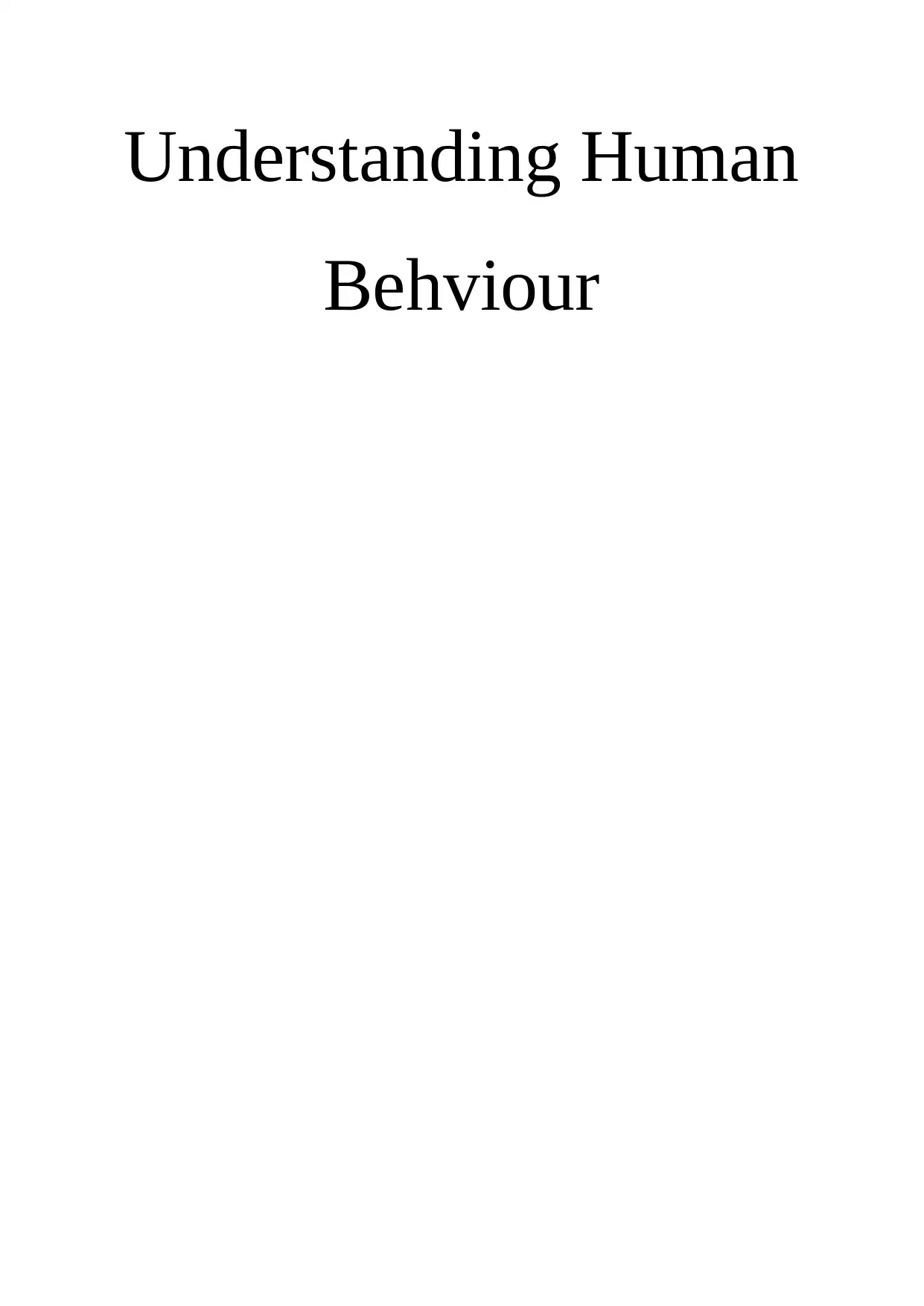
Understanding Human
Behviour
Behviour
Paraphrase This Document
Need a fresh take? Get an instant paraphrase of this document with our AI Paraphraser
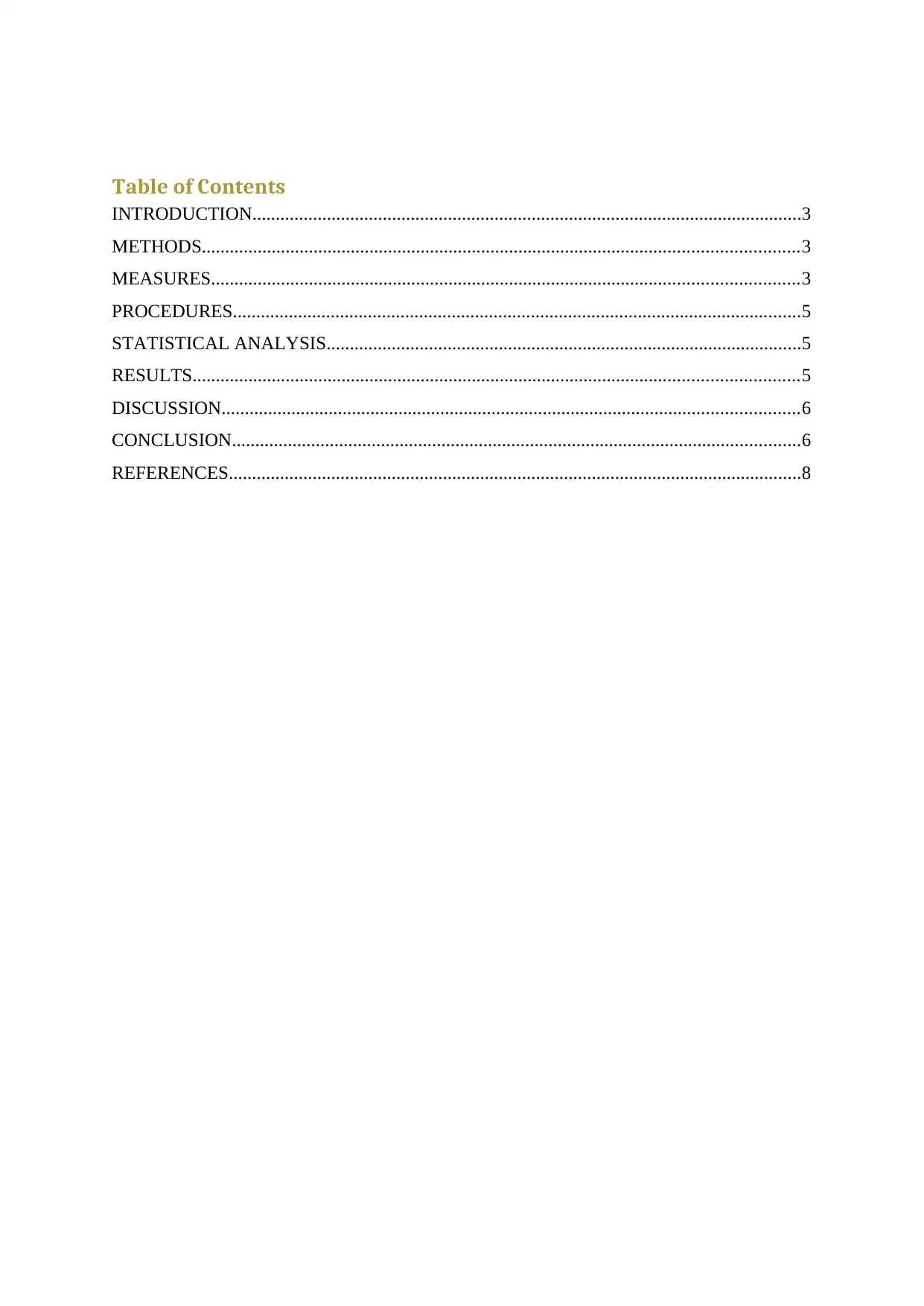
Table of Contents
INTRODUCTION......................................................................................................................3
METHODS................................................................................................................................3
MEASURES..............................................................................................................................3
PROCEDURES..........................................................................................................................5
STATISTICAL ANALYSIS......................................................................................................5
RESULTS..................................................................................................................................5
DISCUSSION............................................................................................................................6
CONCLUSION..........................................................................................................................6
REFERENCES...........................................................................................................................8
INTRODUCTION......................................................................................................................3
METHODS................................................................................................................................3
MEASURES..............................................................................................................................3
PROCEDURES..........................................................................................................................5
STATISTICAL ANALYSIS......................................................................................................5
RESULTS..................................................................................................................................5
DISCUSSION............................................................................................................................6
CONCLUSION..........................................................................................................................6
REFERENCES...........................................................................................................................8
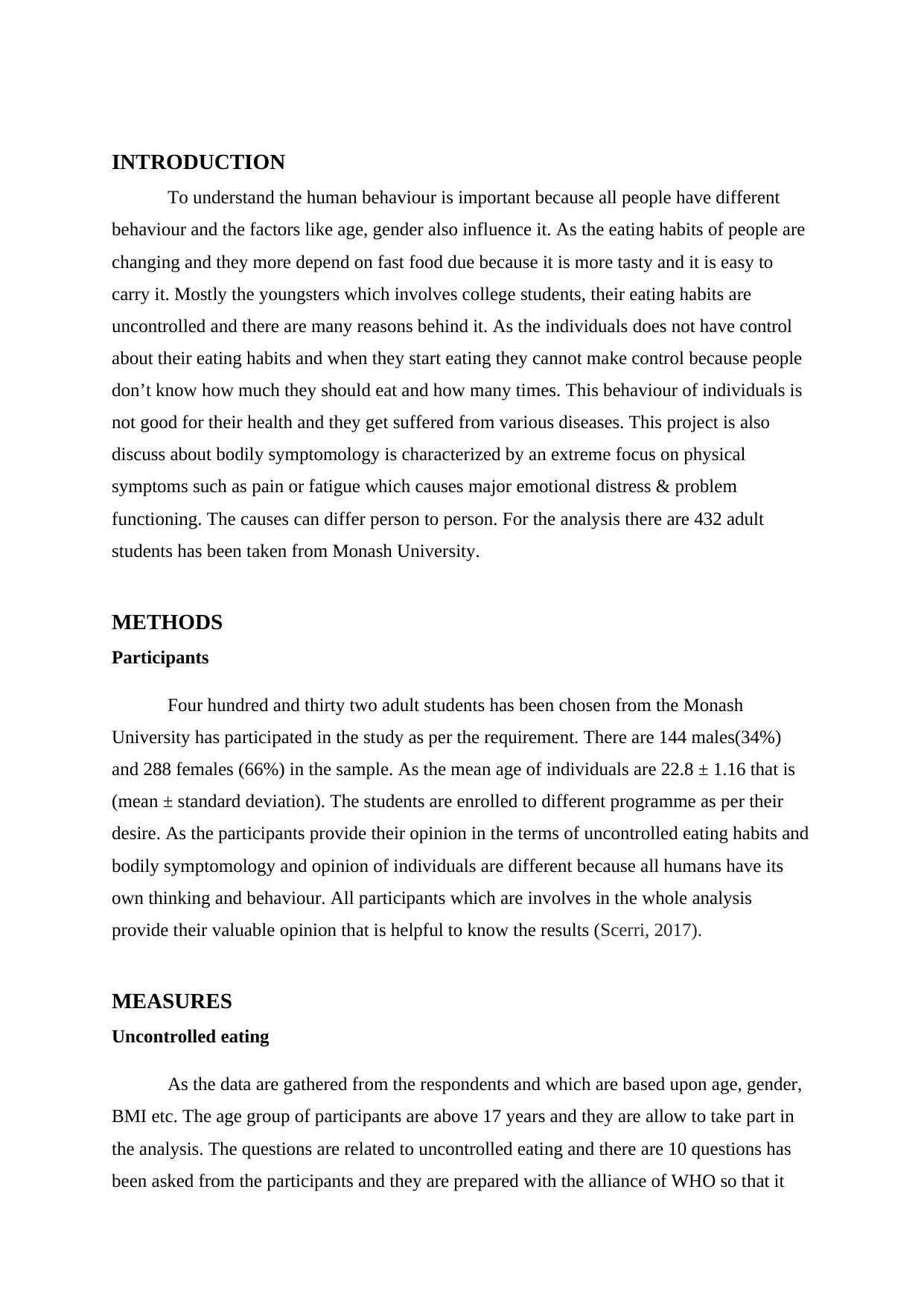
INTRODUCTION
To understand the human behaviour is important because all people have different
behaviour and the factors like age, gender also influence it. As the eating habits of people are
changing and they more depend on fast food due because it is more tasty and it is easy to
carry it. Mostly the youngsters which involves college students, their eating habits are
uncontrolled and there are many reasons behind it. As the individuals does not have control
about their eating habits and when they start eating they cannot make control because people
don’t know how much they should eat and how many times. This behaviour of individuals is
not good for their health and they get suffered from various diseases. This project is also
discuss about bodily symptomology is characterized by an extreme focus on physical
symptoms such as pain or fatigue which causes major emotional distress & problem
functioning. The causes can differ person to person. For the analysis there are 432 adult
students has been taken from Monash University.
METHODS
Participants
Four hundred and thirty two adult students has been chosen from the Monash
University has participated in the study as per the requirement. There are 144 males(34%)
and 288 females (66%) in the sample. As the mean age of individuals are 22.8 ± 1.16 that is
(mean ± standard deviation). The students are enrolled to different programme as per their
desire. As the participants provide their opinion in the terms of uncontrolled eating habits and
bodily symptomology and opinion of individuals are different because all humans have its
own thinking and behaviour. All participants which are involves in the whole analysis
provide their valuable opinion that is helpful to know the results (Scerri, 2017).
MEASURES
Uncontrolled eating
As the data are gathered from the respondents and which are based upon age, gender,
BMI etc. The age group of participants are above 17 years and they are allow to take part in
the analysis. The questions are related to uncontrolled eating and there are 10 questions has
been asked from the participants and they are prepared with the alliance of WHO so that it
To understand the human behaviour is important because all people have different
behaviour and the factors like age, gender also influence it. As the eating habits of people are
changing and they more depend on fast food due because it is more tasty and it is easy to
carry it. Mostly the youngsters which involves college students, their eating habits are
uncontrolled and there are many reasons behind it. As the individuals does not have control
about their eating habits and when they start eating they cannot make control because people
don’t know how much they should eat and how many times. This behaviour of individuals is
not good for their health and they get suffered from various diseases. This project is also
discuss about bodily symptomology is characterized by an extreme focus on physical
symptoms such as pain or fatigue which causes major emotional distress & problem
functioning. The causes can differ person to person. For the analysis there are 432 adult
students has been taken from Monash University.
METHODS
Participants
Four hundred and thirty two adult students has been chosen from the Monash
University has participated in the study as per the requirement. There are 144 males(34%)
and 288 females (66%) in the sample. As the mean age of individuals are 22.8 ± 1.16 that is
(mean ± standard deviation). The students are enrolled to different programme as per their
desire. As the participants provide their opinion in the terms of uncontrolled eating habits and
bodily symptomology and opinion of individuals are different because all humans have its
own thinking and behaviour. All participants which are involves in the whole analysis
provide their valuable opinion that is helpful to know the results (Scerri, 2017).
MEASURES
Uncontrolled eating
As the data are gathered from the respondents and which are based upon age, gender,
BMI etc. The age group of participants are above 17 years and they are allow to take part in
the analysis. The questions are related to uncontrolled eating and there are 10 questions has
been asked from the participants and they are prepared with the alliance of WHO so that it
⊘ This is a preview!⊘
Do you want full access?
Subscribe today to unlock all pages.

Trusted by 1+ million students worldwide
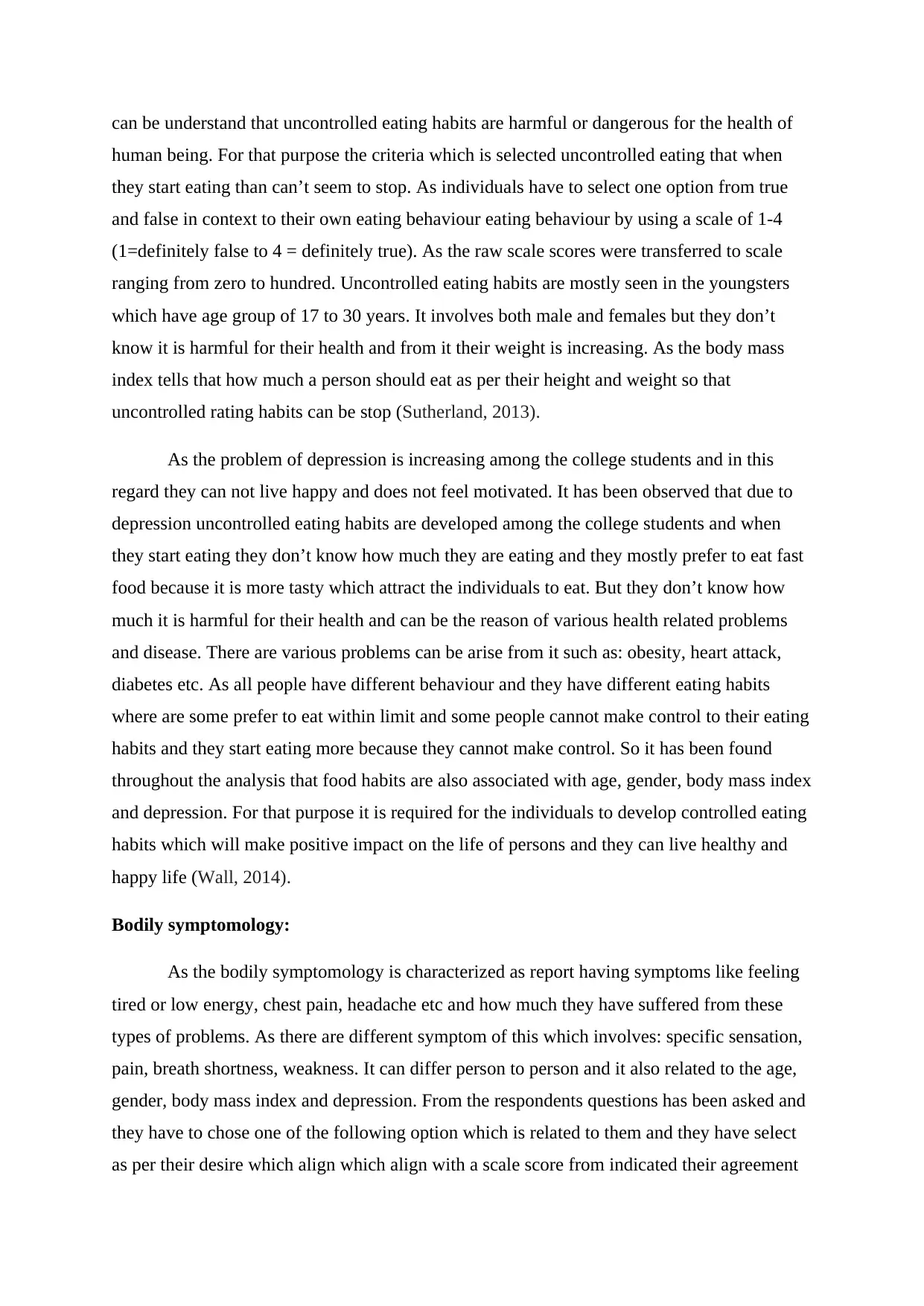
can be understand that uncontrolled eating habits are harmful or dangerous for the health of
human being. For that purpose the criteria which is selected uncontrolled eating that when
they start eating than can’t seem to stop. As individuals have to select one option from true
and false in context to their own eating behaviour eating behaviour by using a scale of 1-4
(1=definitely false to 4 = definitely true). As the raw scale scores were transferred to scale
ranging from zero to hundred. Uncontrolled eating habits are mostly seen in the youngsters
which have age group of 17 to 30 years. It involves both male and females but they don’t
know it is harmful for their health and from it their weight is increasing. As the body mass
index tells that how much a person should eat as per their height and weight so that
uncontrolled rating habits can be stop (Sutherland, 2013).
As the problem of depression is increasing among the college students and in this
regard they can not live happy and does not feel motivated. It has been observed that due to
depression uncontrolled eating habits are developed among the college students and when
they start eating they don’t know how much they are eating and they mostly prefer to eat fast
food because it is more tasty which attract the individuals to eat. But they don’t know how
much it is harmful for their health and can be the reason of various health related problems
and disease. There are various problems can be arise from it such as: obesity, heart attack,
diabetes etc. As all people have different behaviour and they have different eating habits
where are some prefer to eat within limit and some people cannot make control to their eating
habits and they start eating more because they cannot make control. So it has been found
throughout the analysis that food habits are also associated with age, gender, body mass index
and depression. For that purpose it is required for the individuals to develop controlled eating
habits which will make positive impact on the life of persons and they can live healthy and
happy life (Wall, 2014).
Bodily symptomology:
As the bodily symptomology is characterized as report having symptoms like feeling
tired or low energy, chest pain, headache etc and how much they have suffered from these
types of problems. As there are different symptom of this which involves: specific sensation,
pain, breath shortness, weakness. It can differ person to person and it also related to the age,
gender, body mass index and depression. From the respondents questions has been asked and
they have to chose one of the following option which is related to them and they have select
as per their desire which align which align with a scale score from indicated their agreement
human being. For that purpose the criteria which is selected uncontrolled eating that when
they start eating than can’t seem to stop. As individuals have to select one option from true
and false in context to their own eating behaviour eating behaviour by using a scale of 1-4
(1=definitely false to 4 = definitely true). As the raw scale scores were transferred to scale
ranging from zero to hundred. Uncontrolled eating habits are mostly seen in the youngsters
which have age group of 17 to 30 years. It involves both male and females but they don’t
know it is harmful for their health and from it their weight is increasing. As the body mass
index tells that how much a person should eat as per their height and weight so that
uncontrolled rating habits can be stop (Sutherland, 2013).
As the problem of depression is increasing among the college students and in this
regard they can not live happy and does not feel motivated. It has been observed that due to
depression uncontrolled eating habits are developed among the college students and when
they start eating they don’t know how much they are eating and they mostly prefer to eat fast
food because it is more tasty which attract the individuals to eat. But they don’t know how
much it is harmful for their health and can be the reason of various health related problems
and disease. There are various problems can be arise from it such as: obesity, heart attack,
diabetes etc. As all people have different behaviour and they have different eating habits
where are some prefer to eat within limit and some people cannot make control to their eating
habits and they start eating more because they cannot make control. So it has been found
throughout the analysis that food habits are also associated with age, gender, body mass index
and depression. For that purpose it is required for the individuals to develop controlled eating
habits which will make positive impact on the life of persons and they can live healthy and
happy life (Wall, 2014).
Bodily symptomology:
As the bodily symptomology is characterized as report having symptoms like feeling
tired or low energy, chest pain, headache etc and how much they have suffered from these
types of problems. As there are different symptom of this which involves: specific sensation,
pain, breath shortness, weakness. It can differ person to person and it also related to the age,
gender, body mass index and depression. From the respondents questions has been asked and
they have to chose one of the following option which is related to them and they have select
as per their desire which align which align with a scale score from indicated their agreement
Paraphrase This Document
Need a fresh take? Get an instant paraphrase of this document with our AI Paraphraser
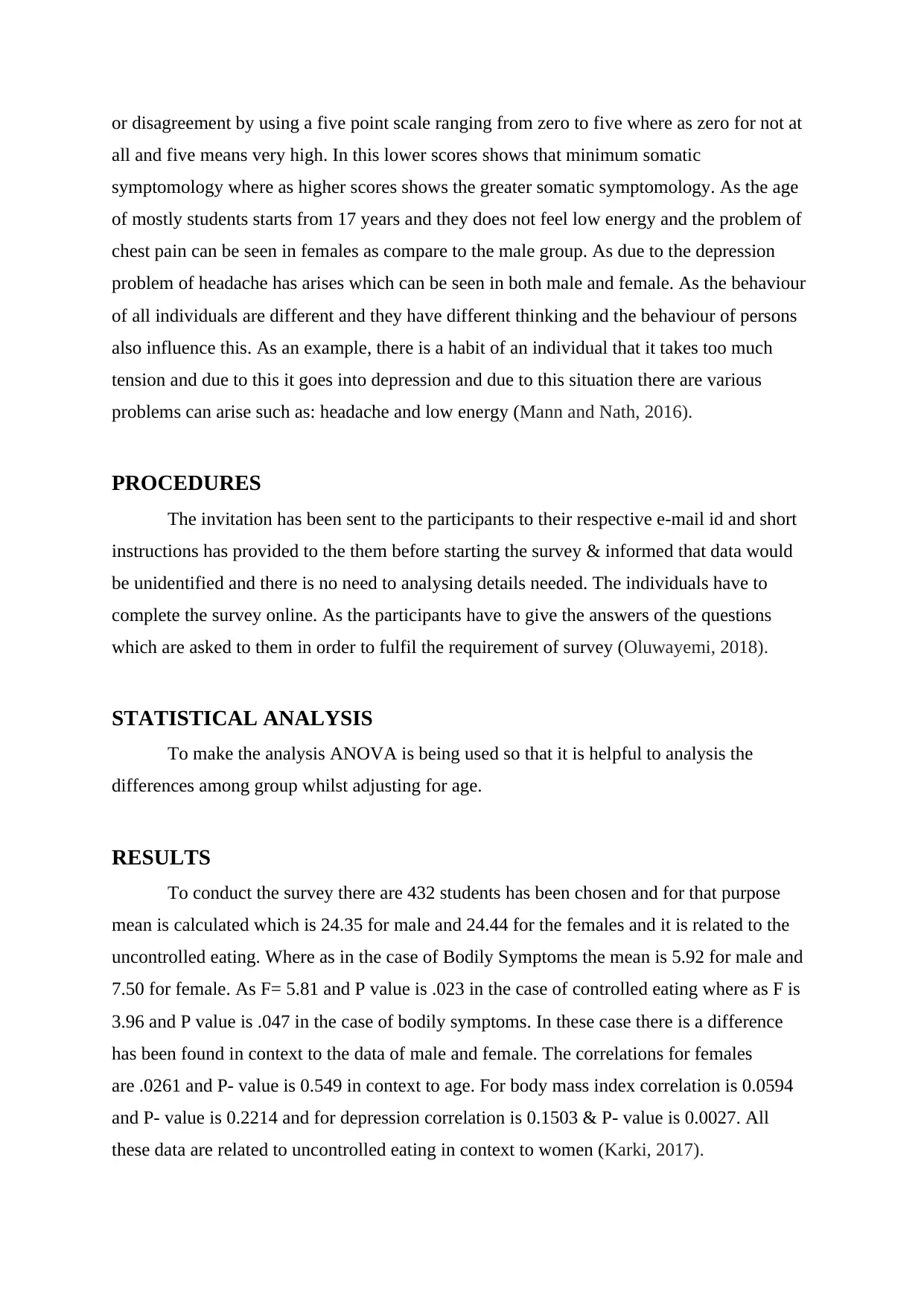
or disagreement by using a five point scale ranging from zero to five where as zero for not at
all and five means very high. In this lower scores shows that minimum somatic
symptomology where as higher scores shows the greater somatic symptomology. As the age
of mostly students starts from 17 years and they does not feel low energy and the problem of
chest pain can be seen in females as compare to the male group. As due to the depression
problem of headache has arises which can be seen in both male and female. As the behaviour
of all individuals are different and they have different thinking and the behaviour of persons
also influence this. As an example, there is a habit of an individual that it takes too much
tension and due to this it goes into depression and due to this situation there are various
problems can arise such as: headache and low energy (Mann and Nath, 2016).
PROCEDURES
The invitation has been sent to the participants to their respective e-mail id and short
instructions has provided to the them before starting the survey & informed that data would
be unidentified and there is no need to analysing details needed. The individuals have to
complete the survey online. As the participants have to give the answers of the questions
which are asked to them in order to fulfil the requirement of survey (Oluwayemi, 2018).
STATISTICAL ANALYSIS
To make the analysis ANOVA is being used so that it is helpful to analysis the
differences among group whilst adjusting for age.
RESULTS
To conduct the survey there are 432 students has been chosen and for that purpose
mean is calculated which is 24.35 for male and 24.44 for the females and it is related to the
uncontrolled eating. Where as in the case of Bodily Symptoms the mean is 5.92 for male and
7.50 for female. As F= 5.81 and P value is .023 in the case of controlled eating where as F is
3.96 and P value is .047 in the case of bodily symptoms. In these case there is a difference
has been found in context to the data of male and female. The correlations for females
are .0261 and P- value is 0.549 in context to age. For body mass index correlation is 0.0594
and P- value is 0.2214 and for depression correlation is 0.1503 & P- value is 0.0027. All
these data are related to uncontrolled eating in context to women (Karki, 2017).
all and five means very high. In this lower scores shows that minimum somatic
symptomology where as higher scores shows the greater somatic symptomology. As the age
of mostly students starts from 17 years and they does not feel low energy and the problem of
chest pain can be seen in females as compare to the male group. As due to the depression
problem of headache has arises which can be seen in both male and female. As the behaviour
of all individuals are different and they have different thinking and the behaviour of persons
also influence this. As an example, there is a habit of an individual that it takes too much
tension and due to this it goes into depression and due to this situation there are various
problems can arise such as: headache and low energy (Mann and Nath, 2016).
PROCEDURES
The invitation has been sent to the participants to their respective e-mail id and short
instructions has provided to the them before starting the survey & informed that data would
be unidentified and there is no need to analysing details needed. The individuals have to
complete the survey online. As the participants have to give the answers of the questions
which are asked to them in order to fulfil the requirement of survey (Oluwayemi, 2018).
STATISTICAL ANALYSIS
To make the analysis ANOVA is being used so that it is helpful to analysis the
differences among group whilst adjusting for age.
RESULTS
To conduct the survey there are 432 students has been chosen and for that purpose
mean is calculated which is 24.35 for male and 24.44 for the females and it is related to the
uncontrolled eating. Where as in the case of Bodily Symptoms the mean is 5.92 for male and
7.50 for female. As F= 5.81 and P value is .023 in the case of controlled eating where as F is
3.96 and P value is .047 in the case of bodily symptoms. In these case there is a difference
has been found in context to the data of male and female. The correlations for females
are .0261 and P- value is 0.549 in context to age. For body mass index correlation is 0.0594
and P- value is 0.2214 and for depression correlation is 0.1503 & P- value is 0.0027. All
these data are related to uncontrolled eating in context to women (Karki, 2017).
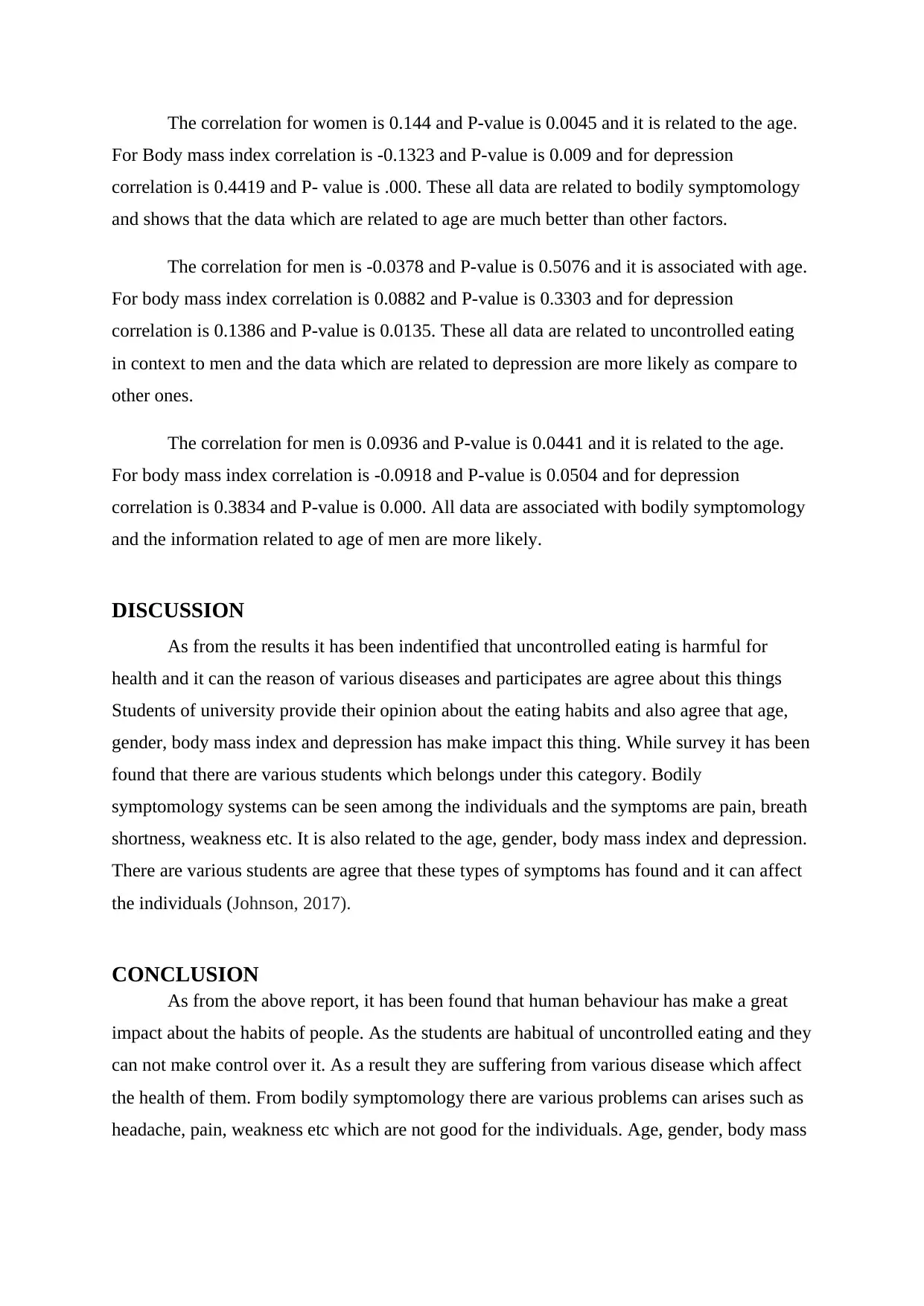
The correlation for women is 0.144 and P-value is 0.0045 and it is related to the age.
For Body mass index correlation is -0.1323 and P-value is 0.009 and for depression
correlation is 0.4419 and P- value is .000. These all data are related to bodily symptomology
and shows that the data which are related to age are much better than other factors.
The correlation for men is -0.0378 and P-value is 0.5076 and it is associated with age.
For body mass index correlation is 0.0882 and P-value is 0.3303 and for depression
correlation is 0.1386 and P-value is 0.0135. These all data are related to uncontrolled eating
in context to men and the data which are related to depression are more likely as compare to
other ones.
The correlation for men is 0.0936 and P-value is 0.0441 and it is related to the age.
For body mass index correlation is -0.0918 and P-value is 0.0504 and for depression
correlation is 0.3834 and P-value is 0.000. All data are associated with bodily symptomology
and the information related to age of men are more likely.
DISCUSSION
As from the results it has been indentified that uncontrolled eating is harmful for
health and it can the reason of various diseases and participates are agree about this things
Students of university provide their opinion about the eating habits and also agree that age,
gender, body mass index and depression has make impact this thing. While survey it has been
found that there are various students which belongs under this category. Bodily
symptomology systems can be seen among the individuals and the symptoms are pain, breath
shortness, weakness etc. It is also related to the age, gender, body mass index and depression.
There are various students are agree that these types of symptoms has found and it can affect
the individuals (Johnson, 2017).
CONCLUSION
As from the above report, it has been found that human behaviour has make a great
impact about the habits of people. As the students are habitual of uncontrolled eating and they
can not make control over it. As a result they are suffering from various disease which affect
the health of them. From bodily symptomology there are various problems can arises such as
headache, pain, weakness etc which are not good for the individuals. Age, gender, body mass
For Body mass index correlation is -0.1323 and P-value is 0.009 and for depression
correlation is 0.4419 and P- value is .000. These all data are related to bodily symptomology
and shows that the data which are related to age are much better than other factors.
The correlation for men is -0.0378 and P-value is 0.5076 and it is associated with age.
For body mass index correlation is 0.0882 and P-value is 0.3303 and for depression
correlation is 0.1386 and P-value is 0.0135. These all data are related to uncontrolled eating
in context to men and the data which are related to depression are more likely as compare to
other ones.
The correlation for men is 0.0936 and P-value is 0.0441 and it is related to the age.
For body mass index correlation is -0.0918 and P-value is 0.0504 and for depression
correlation is 0.3834 and P-value is 0.000. All data are associated with bodily symptomology
and the information related to age of men are more likely.
DISCUSSION
As from the results it has been indentified that uncontrolled eating is harmful for
health and it can the reason of various diseases and participates are agree about this things
Students of university provide their opinion about the eating habits and also agree that age,
gender, body mass index and depression has make impact this thing. While survey it has been
found that there are various students which belongs under this category. Bodily
symptomology systems can be seen among the individuals and the symptoms are pain, breath
shortness, weakness etc. It is also related to the age, gender, body mass index and depression.
There are various students are agree that these types of symptoms has found and it can affect
the individuals (Johnson, 2017).
CONCLUSION
As from the above report, it has been found that human behaviour has make a great
impact about the habits of people. As the students are habitual of uncontrolled eating and they
can not make control over it. As a result they are suffering from various disease which affect
the health of them. From bodily symptomology there are various problems can arises such as
headache, pain, weakness etc which are not good for the individuals. Age, gender, body mass
⊘ This is a preview!⊘
Do you want full access?
Subscribe today to unlock all pages.

Trusted by 1+ million students worldwide

index and depression are also associated with these two things. For the survey students are
taken from the university and their opinion has been consider to find out better results.
taken from the university and their opinion has been consider to find out better results.
Paraphrase This Document
Need a fresh take? Get an instant paraphrase of this document with our AI Paraphraser
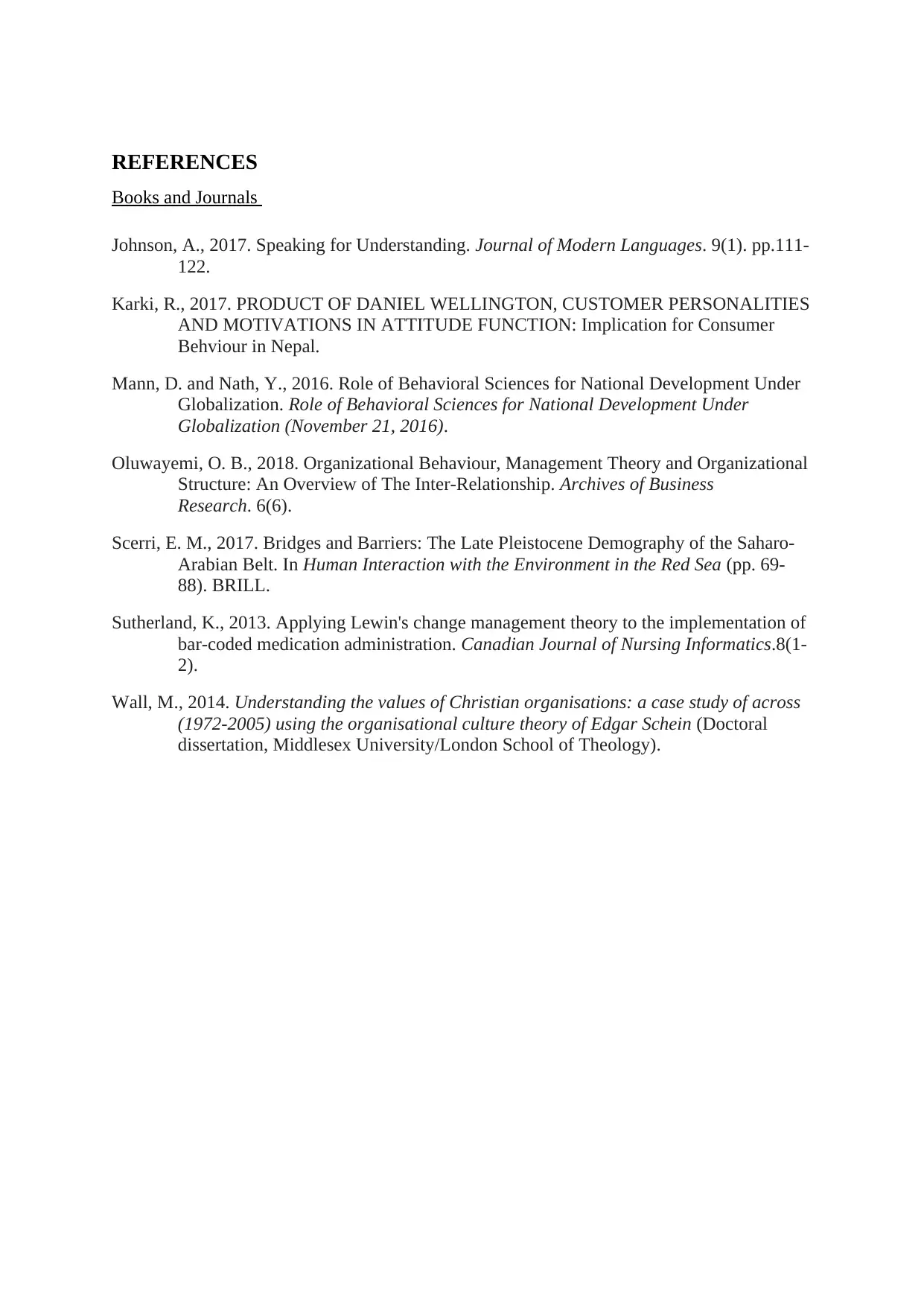
REFERENCES
Books and Journals
Johnson, A., 2017. Speaking for Understanding. Journal of Modern Languages. 9(1). pp.111-
122.
Karki, R., 2017. PRODUCT OF DANIEL WELLINGTON, CUSTOMER PERSONALITIES
AND MOTIVATIONS IN ATTITUDE FUNCTION: Implication for Consumer
Behviour in Nepal.
Mann, D. and Nath, Y., 2016. Role of Behavioral Sciences for National Development Under
Globalization. Role of Behavioral Sciences for National Development Under
Globalization (November 21, 2016).
Oluwayemi, O. B., 2018. Organizational Behaviour, Management Theory and Organizational
Structure: An Overview of The Inter-Relationship. Archives of Business
Research. 6(6).
Scerri, E. M., 2017. Bridges and Barriers: The Late Pleistocene Demography of the Saharo-
Arabian Belt. In Human Interaction with the Environment in the Red Sea (pp. 69-
88). BRILL.
Sutherland, K., 2013. Applying Lewin's change management theory to the implementation of
bar-coded medication administration. Canadian Journal of Nursing Informatics.8(1-
2).
Wall, M., 2014. Understanding the values of Christian organisations: a case study of across
(1972-2005) using the organisational culture theory of Edgar Schein (Doctoral
dissertation, Middlesex University/London School of Theology).
Books and Journals
Johnson, A., 2017. Speaking for Understanding. Journal of Modern Languages. 9(1). pp.111-
122.
Karki, R., 2017. PRODUCT OF DANIEL WELLINGTON, CUSTOMER PERSONALITIES
AND MOTIVATIONS IN ATTITUDE FUNCTION: Implication for Consumer
Behviour in Nepal.
Mann, D. and Nath, Y., 2016. Role of Behavioral Sciences for National Development Under
Globalization. Role of Behavioral Sciences for National Development Under
Globalization (November 21, 2016).
Oluwayemi, O. B., 2018. Organizational Behaviour, Management Theory and Organizational
Structure: An Overview of The Inter-Relationship. Archives of Business
Research. 6(6).
Scerri, E. M., 2017. Bridges and Barriers: The Late Pleistocene Demography of the Saharo-
Arabian Belt. In Human Interaction with the Environment in the Red Sea (pp. 69-
88). BRILL.
Sutherland, K., 2013. Applying Lewin's change management theory to the implementation of
bar-coded medication administration. Canadian Journal of Nursing Informatics.8(1-
2).
Wall, M., 2014. Understanding the values of Christian organisations: a case study of across
(1972-2005) using the organisational culture theory of Edgar Schein (Doctoral
dissertation, Middlesex University/London School of Theology).
1 out of 8
Your All-in-One AI-Powered Toolkit for Academic Success.
+13062052269
info@desklib.com
Available 24*7 on WhatsApp / Email
![[object Object]](/_next/static/media/star-bottom.7253800d.svg)
Unlock your academic potential
Copyright © 2020–2026 A2Z Services. All Rights Reserved. Developed and managed by ZUCOL.
